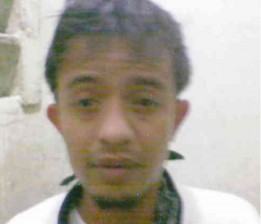Jonas Burgos’ ma: New proof against AFP like bomb

WHERE’S JONAS? After almost six years of fruitless search, this photo of Jonas Burgos, reportedly taken days after he was abducted, has surfaced, with the handkerchief used as blindfold still around his neck. CONTRIBUTED PHOTO
A day after Easter Sunday, Edita Burgos, mother of missing activist Jonas Burgos, hopes to resurrect her more than five-year-long search for her son with new evidence that she said would be a “bomb” against the government.
Burgos, along with family and friends from Bayan and Karapatan, trooped to the Supreme Court on Monday to ask its permission to allow the Court of Appeals (CA)—which recently recognized her son’s abduction as an enforced disappearance and held the military accountable for it—to investigate his case further.
Two units in the Armed Forces of the Philippines were allegedly involved in the case, according to an urgent petition filed in the high tribunal.
“The newly discovered evidence will prove that the officers and enlisted personnel of that particular unit … are responsible for the enforced disappearance of Jonas Burgos; that these units captured and interrogated him and based on the same evidence, could probably continue to detain him or God forbid, had disposed of him in the manner that only they could explain,” it said.
In her 11-page petition, Burgos said she received from an unnamed source documentary evidence “that would prove that an intelligence unit of the 7th Infantry Division of the Philippine Army and the 56th Infantry Battalion operating together captured Jonas” on April 28, 2007, at Ever Gotesco Mall on Commonwealth Avenue in Quezon City.
Article continues after this advertisementThe documentary evidence consisted of “confidential” official reports on file with the Army, including an after-apprehension report, psychosocial processing report and autobiography of Jonas, an agriculturist and son of the late press freedom icon Jose Burgos Jr.
Article continues after this advertisementSealed documents
Saying she was “concerned about her own personal security and would avoid any leak of this information,” Burgos said she submitted her evidence sealed and attached to her motion to be opened by the high court “or only upon its orders.”
She said the papers included the names of officers and enlisted personnel of the two units.
The petition asked the high court to order the persons named in the sealed documents impleaded in the two resolutions it had issued on June 22, 2010, and July 5, 2011, and to issue as well a writ of amparo to the same persons and refer back the cases to the same CA division for further hearing.
Burgos did not want to reveal anything about the evidence to reporters, saying that it will be a “bomb” against the government. She said a “friend of a friend” gave the evidence to her.
Jonas photo
Burgos also posted on the Free Jonas Burgos Movement website a photo of her son purportedly taken after he was abducted with “a handkerchief used as blindfold still around his neck.”
“It is the family’s hope this photo and other newly found evidences will finally bring them closer to finding Jonas Burgos,” the website said.
On March 18, the appellate court recognized Burgos’ abduction as an enforced disappearance and held Maj. Harry Baliaga Jr., as responsible for it as well as the Armed Forces of the Philippines, specifically the Army.
The appellate court also held accountable the Philippine National Police for “the conduct of an exhaustive investigation of the enforced disappearance of Jonas Burgos.”
“The PNP respects the decision of the Court of Appeals. We will implement and comply with the order,” Chief Supt. Generoso Cerbo Jr., PNP spokesman, said in a news briefing.
“The court decision stated that we have to do an exhaustive investigation. The top leadership of the PNP is now discussing this with the concerned police units,” Cerbo said. “We will do everything to bring to justice those responsible.”
The military deferred comment on the appellate court’s decision as it has yet to receive a copy of the ruling, but stressed that it “condemns any act of violation of the basic and constitutional rights of individuals.”
Continuing offense
Bayan Muna Rep. Neri Colmenares said Monday that the abductors of Jonas Burgos could be charged with violating the Anti-Enforced or Involuntary Disappearance Law, which President Aquino signed last December.
Colmenares said that even if the abduction took place five years ago, it could be regarded as a continuing offense and thus the rule on retroactivity of the law would not apply.
“It’s a continuing crime because [military officials] refuse to acknowledge his fate or whereabouts,” he said in a phone interview. “That’s the position taken by human rights lawyers.”
The law defines enforced or involuntary disappearance as the arrest, detention, abduction or any other form of deprivation of liberty committed by agents of the state or by persons or groups of persons acting with the authorization, support or acquiescence of the state, followed by a refusal to acknowledge the deprivation of liberty or by concealment of the fate or whereabouts of the disappeared person, which places such person outside the protection of the law.
Colmenares noted that the law imposed the penalty of reclusion perpetua against those responsible for enforced disappearances.—With reports from Marlon Ramos and Leila B. Salaverria